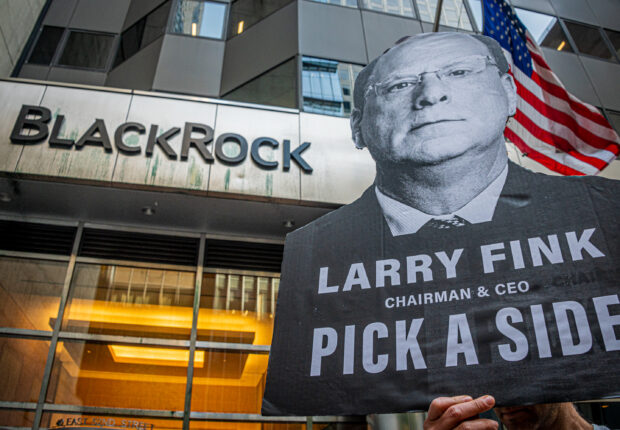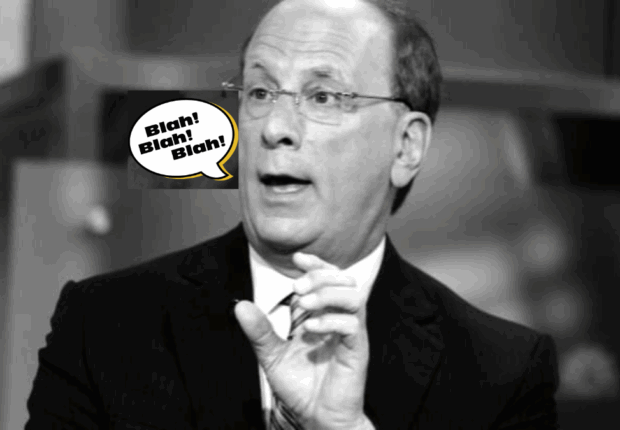World's biggest investor in fossil fuels acknowledges climate change risks, but have its actions caught up? So far corporate rhetoric looks like a lot of hot air.
In January, BlackRock CEO Larry Fink committed to put climate change at the center of the firm’s investment strategy. Even as financial markets reel during the COVID-19 pandemic, BlackRock reinforced that it will continue to hold directors accountable for climate action.
This shareholder season is a critical test to see if BlackRock will make good on its strong words and use its outsized shareholder voting power to push companies to prioritize stemming the worst effects of catastrophic climate change.
We find ourselves in the middle of a spring–and proxy season– unlike any before. Even as the global economy has ground to a near halt, climate change continues to bear down on our collective future. BlackRock’s words acknowledge this, but have its actions caught up? So far the rhetoric looks like a lot of hot air.
BlackRock is Failing the Shareholder Season Test:
In the past BlackRock has had one of the poorest voting records when it comes to supporting key climate resolutions. This year, the proof will be in the pudding. Fink’s January letter explicitly included committing to voting off boards of directors that prevent progress on climate. It also committed BlackRock to more transparency around its voting and engagement with companies on climate change. For BlackRock to make good on its commitments, we expect not just no-votes on the re-election of board members who have impeded progress on climate but prompt disclosure of how BlackRock voted.
We still have some key shareholder meetings to come, but early returns suggest BlackRock is already BackSliding.
- At Duke’s AGM on May 7, Shareholders demanded independent board leadership and increased transparency into Duke’s lobbying–with hugely increased support across three related proposals. Along with Vanguard, BlackRock appears to have undermined the resolution by likely voting against the proposals. Despite saying it would disclose votes and their rationale, BlackRock has yet to explain this decision to the public.
- 46.6% of Dominion Energy’s shareholders supported independent board leadership, reflecting escalating investor demand for independent and climate competent governance. BlackRock holds 7% of shares of Dominion. It has not yet disclosed how it voted, but if it voted against climate competent leadership at Dominion, it will have clearly fallen short of its own pledges.
- Nearly 1/4 of Barclays investors called on the bank to end fossil fuel financing at its AGM, but BlackRock shares were voted against the measure, just a few months after committing to centering climate in its investment decisions.
- BLK voted against resolutions at two Australian oil companies, Woodside Energy and Santos, calling on the companies to set targets in line with the Paris agreement and to disclose their lobbying. From FT: “43 per cent supported a resolution to require Santos to set Paris-aligned targets — the first time globally a targets-based resolution had received such high levels of support — while more than half backed a similar motion at Woodside. The strong support came following the devastating bushfires in Australia, which killed dozens of people and shone a spotlight on how big investors hold companies to account over climate change.”
BlackRock’s Actions Don’t Live Up to Its Rhetoric or the Urgency of the Crisis:
BlackRock bought bonds to support construction of the Keystone XL Pipeline
- In the first week of April, BackRock purchased new bonds in the re-start of construction of the controversial Keystone XL Pipeline. According to Bloomberg data accessed on April 8th, BlackRock holds 0.17% in the Canadian bond and 0.02% in the US bond. As of January 2019, BlackRock was the second biggest shareholder of TC Energy, the builder and operator of KXL, with 4.89% of shares.
- While the bond holdings seem de minimis, any support for the expansion of one of the most hotly contested pipelines in history is a bad idea – especially as it risks spreading the virus to vulnerable rural and Indigenous communities.
Unbridled Authority to Administer Half-Trillion Fed Stimulus Program
- BlackRock was tapped by the Fed to manage three programs, including new corporate credit facilities. As new details emerge, BlackRock faces growing scrutiny around blatant conflicts of interests, lax oversight, and potential bailouts for big oil. BlackRock should be managing taxpayer dollar- backed programs with the same level of caution, including what discretion they have to incorporate prudential and necessary climate risk.
- Diana Best, Senior Strategist for the Sunrise Project said: “BlackRock has said it believes climate change is a core risk to the financial system. If it wouldn’t deal with certain climate risky products for its clients, it shouldn’t be managing these toxic assets for the Fed either. BlackRock must treat this with the same level of caution, risk management, and due diligence it applies for any of its clients and it should maintain its commitments to centering climate risk.”
Human Rights Abuses and Deforestation in the Amazon
- An AmazonWatch’s Report from March noted that: as of (Q4)2019, BlackRock held $2.5 billion of stocks and bonds in Geopark, Frontera Energy, and Andes Petroleum, three of the foreign owned companies drilling for oil in the western Amazon, despite vigorous ongoing legal and on-the-ground resistance from Indigenous and local communities.
- In February BlackRock issued a statement on its engagement with agribusiness – the second leading driver of the climate crisis after fossil fuels. But the statement fails to show how it will hold companies accountable for ongoing climate emissions, deforestation, land grabbing, and broader human rights violations, or public health concerns around agrochemical inputs.
Lackluster Coal Exclusion Policy Is Not Enough
- January’s climate commitments included the introduction of BlackRock’s new coal policy, which states “We are in the process of removing from our discretionary active investment portfolios the public securities (both debt and equity) of companies that generate more than 25% of their revenues from thermal coal production, which we aim to accomplish by the middle of 2020.” While that sounds good, it doesn’t cover companies that operate coal plants and burn coal to produce energy, build new coal plants, or companies who generate power from coal.
- According to analysis the policy actually excludes less than 20% of the coal industry. Worse still, the policy only applies to BlackRock’s actively managed funds, a fraction of their investments.
- While a good coal policy could be a start, the climate crisis needs more holistic action. BlackRock has done next to nothing on its oil and gas investments.
- This clearly falls far short of putting sustainability at the center of investing models and is not even close to enough to tackle the climate crisis.
For more information or questions contact:
Myriam Fallon, myriam@sunriseproject.net, 708.546.9001

